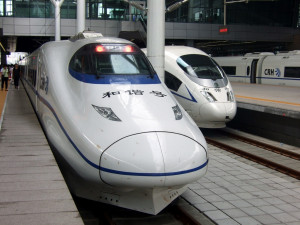
Russia’s Deputy Prime Minister Arkady Dvorkovich announced at a Krasnoyarsk Economic Forum on February 27 that agreement has been finalized between the two countries on a proposal made by Chinese Prime Minister Li Keqiang during his October 2014 visit to Moscow to construct a 7,000 km and $242 billion high-speed rail corridor going from Beijing across Kazakhstan and Russia to Moscow. The project will include a high-speed Moscow to Kazar in Russia’s Autonomous Tatarstan.
While the economies of the EU sink deeper into debt and stagnation of investment in its own rail and other infrastructure, China has become the world’s premier infrastructure builder. In a space little more than thirty years, the Asian country has become the world specialist in railway construction with projects across China and beyond. Last year the Chinese government announced that it had made construction of a trans-Eurasian high speed rail project, the so-called New Silk Road, highest state priority.
The project when completed will reduce rail time from Moscow to Beijing from the present 6 days down to a mere two days. Far more important that passenger travel however will be the new possibilities to reduce shipping time for freight traffic across Eurasia. The rail link will literally “create” entire new markets in the hinterlands of Eurasia.
One example makes it clear. Presently the 803 Km rail journey from Moscow to Kazar takes 14 hours and 7 minutes. The new high-speed line will cut the time to Kazan to just 3 hours and 30 minutes. That brings the two cities closer for economic ties to expand. Similarly for Nizhny Novgorod. That will mean more business traffic, logistics links will emerge and the depopulation trends for Russia’s interior can begin to reverse as economic growth spreads.
The Moscow-Kazan rail link will cut time from 14 hours to just 31/2 hours
First Vice President of Russian Railways, Alexander Misharin, said in November that it would cost $60 billion to reach the Russian border from Moscow to Kazakhstan and that the journey from Moscow to Beijing could be done within 30 hours. Misharin estimates construction will take 8 to 10 years. He compared the new railway network to the Suez Canal “in terms of scale and significance.”
While the EU faces chocking debt crises across the Eurozone from Greece to France, Italy, Spain and investment declines amid repeated US-ordered economic and financial sanctions against Russia, the two Eurasian nations are welding long-term overland economic bonds that are making US foreign policy guru Zbigniew Brzezinski get gas pains. In 1997, a time when America was the unquestioned Sole Superpower following the dis-orderly collapse of the Soviet Union, Brzezinski wrote,
It is imperative that no Eurasian challenger emerges, capable of dominating Eurasia and thus of also challenging America…How America ‘manages’ Eurasia is critical. A power that dominates Eurasia would control two of the world’s three most advanced and economically productive regions. A mere glance at the map also suggests that control over Eurasia would almost automatically entail Africa’s subordination, rendering the Western Hemisphere and Oceania (Australia) geopolitically peripheral to the world’s central continent. About 75 per cent of the world’s people live in Eurasia, and most of the world’s physical wealth is there as well, both in its enterprises and underneath its soil. Eurasia accounts for about three-fourths of the world’s known energy resources.”
The Eurasian challenge is here and that is the real reason for US war in Ukraine and its attempts at economic and military encirclement of China. Whether Washington succeeds in fomenting chaos and more dis-order remains to be seen.
F. William Engdahl is strategic risk consultant and lecturer, he holds a degree in politics from Princeton University and is a best-selling author on oil and geopolitics, exclusively for the online magazine “New Eastern Outlook”.
